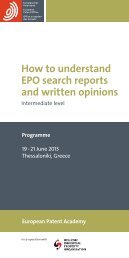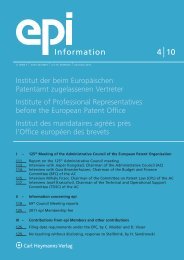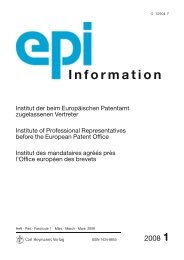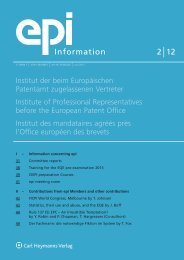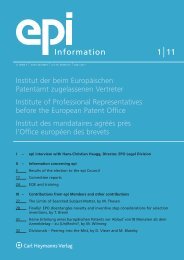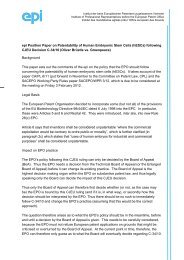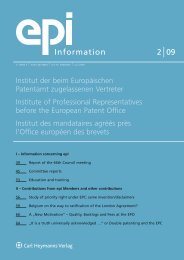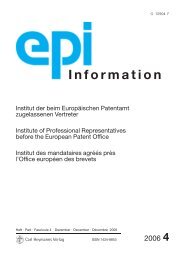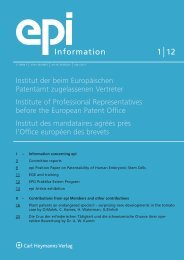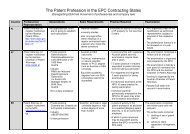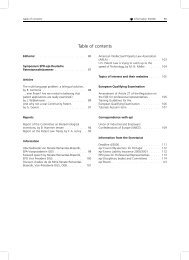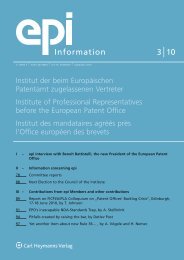Position Paper concerning the Draft Agreement on a Unified ... - epi
Position Paper concerning the Draft Agreement on a Unified ... - epi
Position Paper concerning the Draft Agreement on a Unified ... - epi
You also want an ePaper? Increase the reach of your titles
YUMPU automatically turns print PDFs into web optimized ePapers that Google loves.
Institut der beim Europäischen Patentamt zugelassenen Vertreter<br />
Institute of Professi<strong>on</strong>al Representatives before <str<strong>on</strong>g>the</str<strong>on</strong>g> European Patent Office<br />
Institut des mandataires agréés près l´Office européen des brevets<br />
<str<strong>on</strong>g>Positi<strong>on</strong></str<strong>on</strong>g> <str<strong>on</strong>g>Paper</str<strong>on</strong>g> <str<strong>on</strong>g>c<strong>on</strong>cerning</str<strong>on</strong>g> <str<strong>on</strong>g>the</str<strong>on</strong>g> <str<strong>on</strong>g>Draft</str<strong>on</strong>g> <str<strong>on</strong>g>Agreement</str<strong>on</strong>g> <strong>on</strong> a <strong>Unified</strong> Patent Court and <str<strong>on</strong>g>Draft</str<strong>on</strong>g><br />
Statute (16023/11)<br />
1. On 26 October 2011, <str<strong>on</strong>g>the</str<strong>on</strong>g> Polish Presidency issued a revised versi<strong>on</strong> of <str<strong>on</strong>g>the</str<strong>on</strong>g> <str<strong>on</strong>g>Draft</str<strong>on</strong>g><br />
<str<strong>on</strong>g>Agreement</str<strong>on</strong>g> <strong>on</strong> a <strong>Unified</strong> Patent Court and <str<strong>on</strong>g>Draft</str<strong>on</strong>g> Statute (16023/11). This versi<strong>on</strong>, based <strong>on</strong><br />
<str<strong>on</strong>g>the</str<strong>on</strong>g> modified draft agreement of 14th June 2011 prepared by <str<strong>on</strong>g>the</str<strong>on</strong>g> Hungarian Presidency<br />
(11533/11), seeks to adapt <str<strong>on</strong>g>the</str<strong>on</strong>g> previous draft agreement for <str<strong>on</strong>g>the</str<strong>on</strong>g> European and Community<br />
Patent Court to ensure compliance with <str<strong>on</strong>g>the</str<strong>on</strong>g> EU Treaties: this, in resp<strong>on</strong>se to <str<strong>on</strong>g>the</str<strong>on</strong>g> opini<strong>on</strong> 1/09<br />
of <str<strong>on</strong>g>the</str<strong>on</strong>g> Court of Justice of <str<strong>on</strong>g>the</str<strong>on</strong>g> European Uni<strong>on</strong> (CJEU).<br />
2. The <strong>epi</strong> has reviewed <str<strong>on</strong>g>the</str<strong>on</strong>g> draft agreements and welcomes <str<strong>on</strong>g>the</str<strong>on</strong>g> progress being made in this<br />
area. Never<str<strong>on</strong>g>the</str<strong>on</strong>g>less <str<strong>on</strong>g>the</str<strong>on</strong>g> <strong>epi</strong> believes that in order to achieve a system that is fit for purpose,<br />
careful c<strong>on</strong>siderati<strong>on</strong> of a number of important points is still required. The <strong>epi</strong> fur<str<strong>on</strong>g>the</str<strong>on</strong>g>rmore<br />
adopts <str<strong>on</strong>g>the</str<strong>on</strong>g> following positi<strong>on</strong> in respect of certain articles of <str<strong>on</strong>g>the</str<strong>on</strong>g> draft agreement.<br />
Article 6 - Compositi<strong>on</strong> of <str<strong>on</strong>g>the</str<strong>on</strong>g> panels of <str<strong>on</strong>g>the</str<strong>on</strong>g> Court of First Instance<br />
3. The <strong>epi</strong> is of <str<strong>on</strong>g>the</str<strong>on</strong>g> opini<strong>on</strong> that for each local or regi<strong>on</strong>al panel, <strong>on</strong>e of <str<strong>on</strong>g>the</str<strong>on</strong>g> judges should be<br />
technically qualified and that <str<strong>on</strong>g>the</str<strong>on</strong>g> three judges of any panel should be of three different<br />
nati<strong>on</strong>alities. If this compositi<strong>on</strong> of <str<strong>on</strong>g>the</str<strong>on</strong>g> panels would not be agreed, <str<strong>on</strong>g>the</str<strong>on</strong>g> <strong>epi</strong> c<strong>on</strong>siders that<br />
Article 6 should be reviewed specifically in this respect under Article 58d.<br />
4. The <strong>epi</strong> can agree to <str<strong>on</strong>g>the</str<strong>on</strong>g> proposal under Article 6(2a) for divisi<strong>on</strong>s with a low number of<br />
cases but is of <str<strong>on</strong>g>the</str<strong>on</strong>g> opini<strong>on</strong> that no two judges <strong>on</strong> a panel should have <str<strong>on</strong>g>the</str<strong>on</strong>g> same nati<strong>on</strong>ality<br />
[see Article 6 (3)], in order to provide procedures, reas<strong>on</strong>ing and decisi<strong>on</strong>-making which are<br />
European-based ra<str<strong>on</strong>g>the</str<strong>on</strong>g>r than nati<strong>on</strong>al.<br />
5. Article 6(5) makes provisi<strong>on</strong> for an additi<strong>on</strong>al technical judge, giving a panel of four judges.<br />
The <strong>epi</strong> is of <str<strong>on</strong>g>the</str<strong>on</strong>g> opini<strong>on</strong> that <strong>on</strong>e of <str<strong>on</strong>g>the</str<strong>on</strong>g> judges from <str<strong>on</strong>g>the</str<strong>on</strong>g> pool should always be a technical<br />
judge (avoiding <str<strong>on</strong>g>the</str<strong>on</strong>g> loss of time with requesting a fourth judge). The <strong>epi</strong> is particularly<br />
c<strong>on</strong>cerned that <str<strong>on</strong>g>the</str<strong>on</strong>g> specific provisi<strong>on</strong> for technical judges in revocati<strong>on</strong> acti<strong>on</strong>s before <str<strong>on</strong>g>the</str<strong>on</strong>g><br />
central divisi<strong>on</strong> [Article 15a(2)(a)] creates <str<strong>on</strong>g>the</str<strong>on</strong>g> err<strong>on</strong>eous impressi<strong>on</strong> that judging <str<strong>on</strong>g>the</str<strong>on</strong>g><br />
The President | Ant<strong>on</strong>ius Tangena<br />
c/o <strong>epi</strong> Secretariat: P.O. Box 26 01 12 | 80058 Munich | Germany<br />
Tel: +49 89 242052-0 | Fax: +49 89 242052-20 Direct Ph<strong>on</strong>e +31 40 2324 620<br />
info@patent<strong>epi</strong>.com | www.patent<strong>epi</strong>.com<br />
president@patent<strong>epi</strong>.com
Institut der beim Europäischen Patentamt zugelassenen Vertreter<br />
Institute of Professi<strong>on</strong>al Representatives before <str<strong>on</strong>g>the</str<strong>on</strong>g> European Patent Office<br />
Institut des mandataires agréés près l´Office européen des brevets<br />
infringement of a patent does not require technical knowledge. This role may be fulfilled by a<br />
legally qualified judge who is also technically qualified.<br />
Article 14f to 14i - Substantive law<br />
6. The <strong>epi</strong> is of <str<strong>on</strong>g>the</str<strong>on</strong>g> opini<strong>on</strong> that <str<strong>on</strong>g>the</str<strong>on</strong>g> correct place for substantive provisi<strong>on</strong>s is in <str<strong>on</strong>g>the</str<strong>on</strong>g> present<br />
agreement ra<str<strong>on</strong>g>the</str<strong>on</strong>g>r than in <str<strong>on</strong>g>the</str<strong>on</strong>g> unitary patent regulati<strong>on</strong>, and c<strong>on</strong>siders <str<strong>on</strong>g>the</str<strong>on</strong>g>refore that <str<strong>on</strong>g>the</str<strong>on</strong>g><br />
reference in <str<strong>on</strong>g>the</str<strong>on</strong>g>se provisi<strong>on</strong>s of substantive patent law to “European patent” should be<br />
replaced by “Patent”.<br />
Article 15(1)(g) – Competence of <str<strong>on</strong>g>the</str<strong>on</strong>g> Court<br />
7. The acti<strong>on</strong>s referred to in Article 15(1)(g) relate to administrative procedures of <str<strong>on</strong>g>the</str<strong>on</strong>g> EPO<br />
including such matters as appeals in relati<strong>on</strong> to lapsed patents due to failure to timely pay<br />
renewal fees. The <strong>epi</strong> is c<strong>on</strong>cerned that <str<strong>on</strong>g>the</str<strong>on</strong>g> Court should have jurisdicti<strong>on</strong> over such<br />
administrative appeals as this could lead to high costs and additi<strong>on</strong>al procedural<br />
complicati<strong>on</strong>s for relatively minor/simple matters. The <strong>epi</strong> believes <str<strong>on</strong>g>the</str<strong>on</strong>g>se issues could be<br />
better handled by <str<strong>on</strong>g>the</str<strong>on</strong>g> EPO Boards of Appeal.<br />
Article 15a - Jurisdicti<strong>on</strong> of <str<strong>on</strong>g>the</str<strong>on</strong>g> divisi<strong>on</strong>s of <str<strong>on</strong>g>the</str<strong>on</strong>g> Court of First Instance<br />
8. The <strong>epi</strong> takes <str<strong>on</strong>g>the</str<strong>on</strong>g> positi<strong>on</strong> that c<strong>on</strong>solidati<strong>on</strong> of acti<strong>on</strong>s in cases where multiple defendants<br />
have been served should be provided for in <str<strong>on</strong>g>the</str<strong>on</strong>g> Rules of Procedure.<br />
9. Article 15a(2) retains <str<strong>on</strong>g>the</str<strong>on</strong>g> possibility of split proceedings. The <strong>epi</strong> is of <str<strong>on</strong>g>the</str<strong>on</strong>g> opini<strong>on</strong> that in<br />
general such a possibility is not desirable but recognises that this wording may be necessary<br />
as a political compromise. Never<str<strong>on</strong>g>the</str<strong>on</strong>g>less, with respect to Article 15a(4) <str<strong>on</strong>g>the</str<strong>on</strong>g> <strong>epi</strong> c<strong>on</strong>siders that<br />
if a case is pending before <str<strong>on</strong>g>the</str<strong>on</strong>g> central divisi<strong>on</strong>, any counterclaim (which would normally be<br />
for infringement) should be dealt with by <str<strong>on</strong>g>the</str<strong>on</strong>g> central divisi<strong>on</strong>, to avoid <str<strong>on</strong>g>the</str<strong>on</strong>g> expense and<br />
extreme inc<strong>on</strong>venience of a transfer to ano<str<strong>on</strong>g>the</str<strong>on</strong>g>r divisi<strong>on</strong>.<br />
page 2 of 3
Institut der beim Europäischen Patentamt zugelassenen Vertreter<br />
Institute of Professi<strong>on</strong>al Representatives before <str<strong>on</strong>g>the</str<strong>on</strong>g> European Patent Office<br />
Institut des mandataires agréés près l´Office européen des brevets<br />
Article 28 Representati<strong>on</strong><br />
10. Article 28(2) states that parties may be represented by EPA’s who have appropriate extra<br />
qualificati<strong>on</strong>s. Article 28(2a) states “Representatives of <str<strong>on</strong>g>the</str<strong>on</strong>g> parties may be assisted by<br />
patent attorneys who shall be allowed to speak at hearings of <str<strong>on</strong>g>the</str<strong>on</strong>g> Court in accordance with<br />
<str<strong>on</strong>g>the</str<strong>on</strong>g> Rules or Procedure.” N<strong>on</strong>e of <str<strong>on</strong>g>the</str<strong>on</strong>g> documents published to date define what is meant by<br />
“patent attorneys”.<br />
11. There is in <str<strong>on</strong>g>the</str<strong>on</strong>g> European Uni<strong>on</strong> c<strong>on</strong>siderable variati<strong>on</strong> in <str<strong>on</strong>g>the</str<strong>on</strong>g> significance of <str<strong>on</strong>g>the</str<strong>on</strong>g> title<br />
“patent attorney”, from those states in which <str<strong>on</strong>g>the</str<strong>on</strong>g> assumpti<strong>on</strong> of <str<strong>on</strong>g>the</str<strong>on</strong>g> title is c<strong>on</strong>trolled by an<br />
examinati<strong>on</strong> at a level roughly equivalent to <str<strong>on</strong>g>the</str<strong>on</strong>g> European Qualifying Examinati<strong>on</strong> (though<br />
<str<strong>on</strong>g>the</str<strong>on</strong>g> syllabus is different) to those states in which <str<strong>on</strong>g>the</str<strong>on</strong>g>re is no examinati<strong>on</strong>. To avoid <str<strong>on</strong>g>the</str<strong>on</strong>g><br />
problems of defining <str<strong>on</strong>g>the</str<strong>on</strong>g> term “patent attorney”, <str<strong>on</strong>g>the</str<strong>on</strong>g> <strong>epi</strong> proposes that it be replaced by <str<strong>on</strong>g>the</str<strong>on</strong>g><br />
term “European Patent Attorney”. If this amendment is made, a European Patent Attorney<br />
can assist <str<strong>on</strong>g>the</str<strong>on</strong>g> parties and speak at hearings of <str<strong>on</strong>g>the</str<strong>on</strong>g> Court even though he or she does not<br />
have <str<strong>on</strong>g>the</str<strong>on</strong>g> appropriate extra qualificati<strong>on</strong>s referred to in Article 28(2).<br />
12. Article 28(4) refers to <str<strong>on</strong>g>the</str<strong>on</strong>g> rights and immunities including <str<strong>on</strong>g>the</str<strong>on</strong>g> privilege enjoyed by <str<strong>on</strong>g>the</str<strong>on</strong>g><br />
representatives of <str<strong>on</strong>g>the</str<strong>on</strong>g> parties. This wording should be amended to explicitly include<br />
reference to <str<strong>on</strong>g>the</str<strong>on</strong>g> assisting European patent attorney referred to in Article 28(2a).<br />
Article 58 Transiti<strong>on</strong>al period<br />
13. The transiti<strong>on</strong>al period is five years from <str<strong>on</strong>g>the</str<strong>on</strong>g> entry into force with an opt-out during those<br />
years for both EP patents or bundle patents granted before <str<strong>on</strong>g>the</str<strong>on</strong>g> entry into force. It is noted<br />
that Article 58(d) provides for a c<strong>on</strong>sultati<strong>on</strong> with users at least six years after entry into force<br />
of <str<strong>on</strong>g>the</str<strong>on</strong>g> <str<strong>on</strong>g>Agreement</str<strong>on</strong>g>. If patentees <str<strong>on</strong>g>the</str<strong>on</strong>g>reafter wish to c<strong>on</strong>tinue to use nati<strong>on</strong>al courts, <str<strong>on</strong>g>the</str<strong>on</strong>g>y will<br />
have to file nati<strong>on</strong>al patent applicati<strong>on</strong>s. The <strong>epi</strong> is of <str<strong>on</strong>g>the</str<strong>on</strong>g> opini<strong>on</strong> that a l<strong>on</strong>ger transiti<strong>on</strong><br />
period would be necessary, in particular, in <str<strong>on</strong>g>the</str<strong>on</strong>g> light of <str<strong>on</strong>g>the</str<strong>on</strong>g> period for <str<strong>on</strong>g>the</str<strong>on</strong>g> c<strong>on</strong>sultati<strong>on</strong> under<br />
Article 58(d).<br />
page 3 of 3



